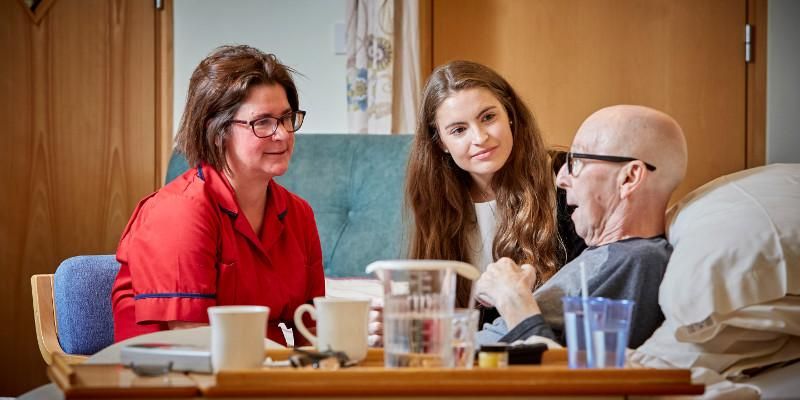
St Gemma’s Hospice in Leeds is to become the first formally recognised university teaching hospice in the UK, following the announcement of a strengthened relationship with the University.
The hospice, the largest in Yorkshire, will mark its new status at a launch event this September, following a pioneering agreement with the University of Leeds.
It has been supported by NHS Health Education England and reflects the long-standing relationship between St Gemma’s and the University of Leeds, providing a stronger platform for teaching and research in the future.
The new permanent extended relationship provides increased capacity for Leeds students to study palliative care in practice at St Gemma’s as part of their degrees.
Raising the profile of palliative care research nationally and internationally, and ensuring the sector has a continued flow of expert medical and managerial personnel is a key feature of the new relationship.
Research in practice

Leeds graduate Dr Chris Jones and Nurse Consultant Catherine Malia discuss a teaching case with Professor Mike Bennett and current student Natalie Woodhouse.
Catherine Malia, Nurse Consultant at St Gemma's Hospice said: “Research undertaken by the St Gemma's academic unit of palliative care demonstrated that provision of information to patients about pain and effective use of painkillers leads to reduction in patients' pain levels.
“As a result, we have developed patient information resources which educate patients about their pain, how to take pain killers safely and effectively and dispel some of the common fears associated with strong pain killers. We routinely provide these materials to patients when we are advising them to use pain killing drugs.'
Effective relationship
Kerry Jackson, Chief Executive of St Gemma’s said: “Patients and families already receive outstanding care, as judged by the Care Quality Commission. The new relationship we have created with the University of Leeds, means we can take that further, and embed research-based training and teaching into all our operations.”
Dr Peter Bellfield, Chair of Trustees at the Hospice, added: “We’re delighted to have formed this partnership with the University of Leeds which will improve even further the standard of compassion and care we can give to our patients. It has been built on years of positive experience of working with the University and will also benefit students in the future.”
Ongoing studies
The hospice and the university joined forces in 2011 to appoint Professor Mike Bennett as the St Gemma’s professor of palliative medicine. Professor Bennett leads the Academic Unit of Palliative Care based at the University’s Leeds Institute of Health Sciences and at St Gemma’s Hospice.
The hospice has provided university teaching and training in the form of a postgraduate healthcare course for more than 20 years and works with around 200 medical students per year to develop their skills in this area.
“The people we look after will be treated in the best way possible and, as patients’ needs change over time, we will always be in a position to adapt because of the new research which will be carried out.”
Professor Bennett said: “The work we have carried out together has ensured St Gemma’s staff and volunteers have had the most up-to-date education in standards of care, based on evidence from ongoing research programmes.
“Formalising this partnership between two of the city’s most respected organisations means patients for years to come will continue to be well supported. It also provides an opportunity to raise the profile of teaching and research in palliative care nationally.
“Ultimately it means the people we look after will be treated in the best way possible and, as patients’ needs change over time, we will always be in a position to adapt because of the new research which will be carried out.”
Outstanding care
In its most recent assessment, the Care Quality Commission specifically highlighted the hospice’s academic unit, led by Professor Bennett, as a factor in improving patient care which contributed to the overall ‘outstanding’ rating.
As a result of the partnership, further undergraduate and master’s level teaching will be carried out, and significant palliative care research projects led by Professor Bennett will be planned. These will expand on previous research work.
Both organisations see the arrangement as a trajectory for ever-further improvement, to support the sector and the patients at St Gemma’s, by embedding best practice.
Working with the team and patients will also give more people within the university medical research community unique insight into how a leading hospice operates, helping improve the organisation of research projects.
Notes to editors:
Journalists with requests for interviews or further information can contact Peter Le Riche at the University of Leeds on 0113 343 2049 or email p.leriche@leeds.ac.uk
The hospice and university have consulted with the UK Medical Schools Council which has said it was ‘pleased hospices are beginning to engage in this way’.
The Department for Business, Innovation and Skills and the Department for Education have also provided approval as part of the process. In addition, the proposal has also been supported by NHS Health Education England’s Yorkshire and the Humber division.
The relationship between the University and the hospice is not financially based, and will not affect the hospice’s need to raise funds from generous public donations to support its ongoing work.